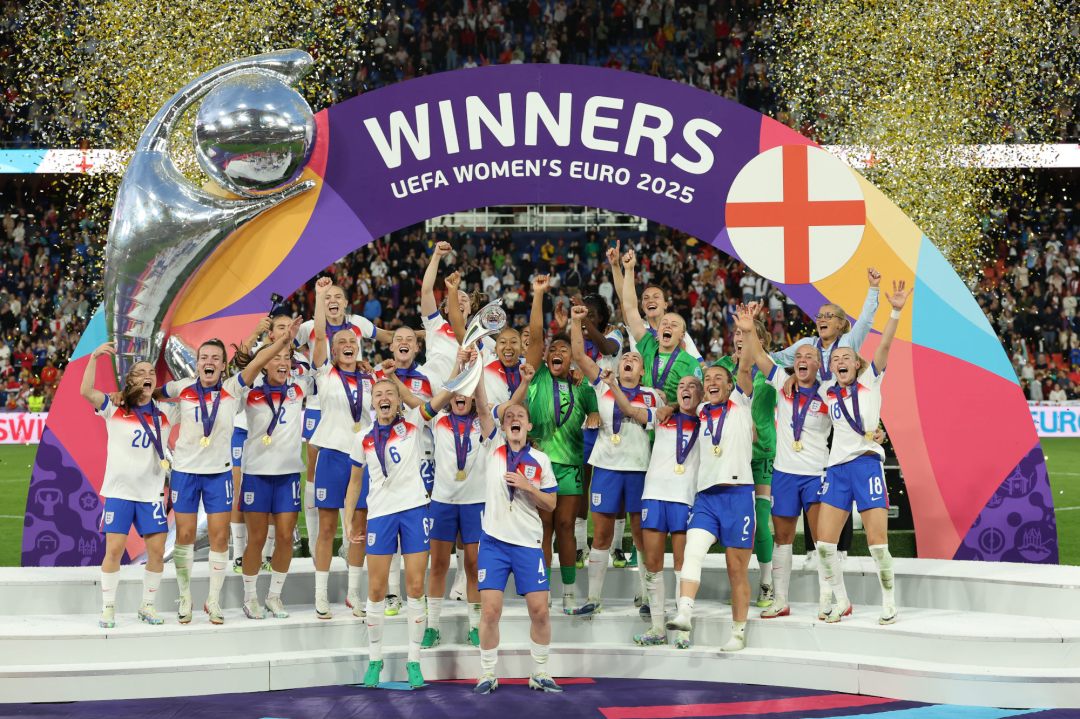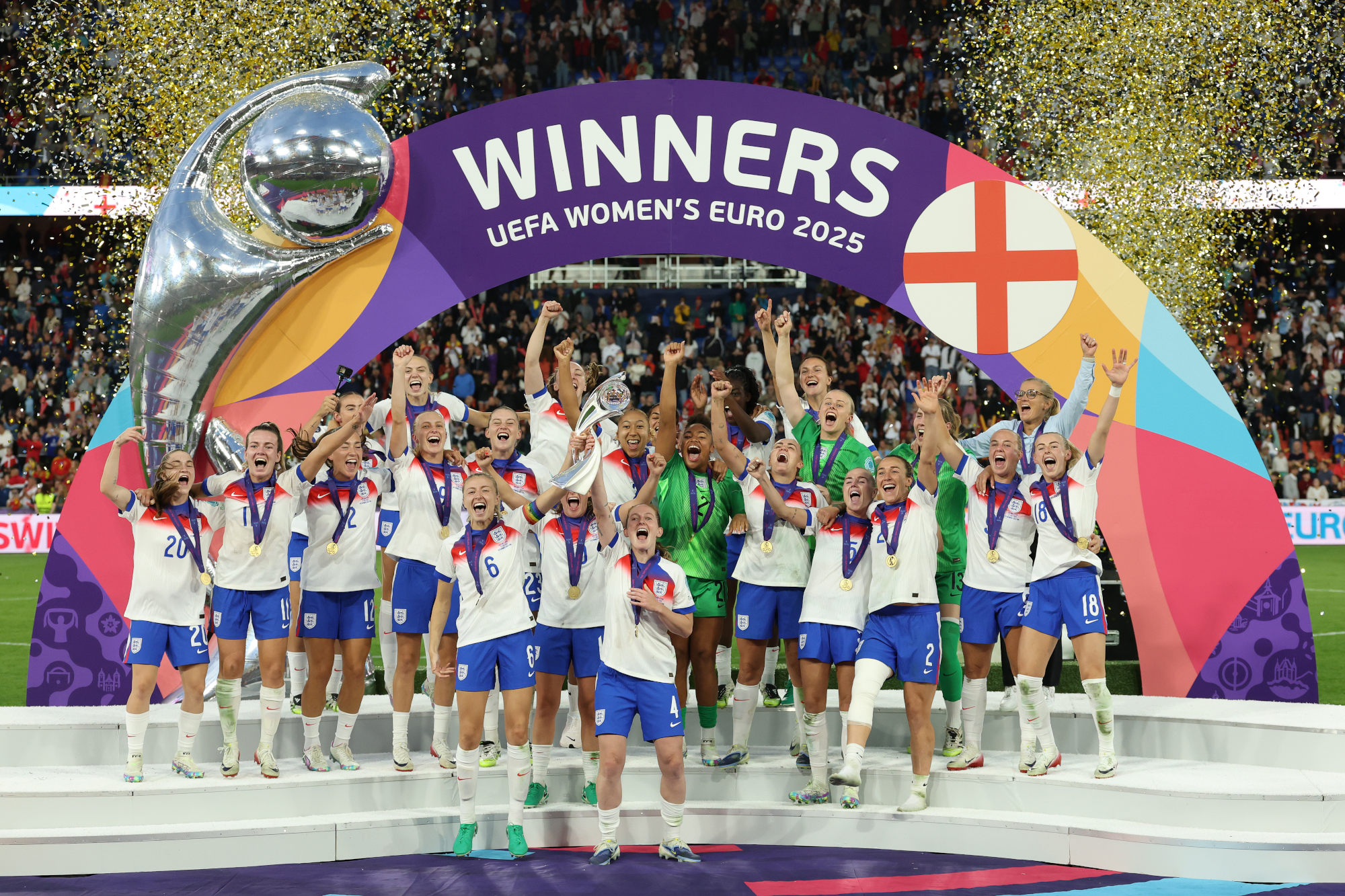England did two remarkable things in Basel last night: winning an international title overseas and doing it by that most un-British method, penalties. You have to hand it to Chloe Kelly’s heroes, it was quite a triumph. ‘I’m proud to be English right now’ said the scorer of the winning goal in successive Euros – not something you hear too often these days.
The media will tell us that the tournament was a glorious success but as always with women’s football one must resist exaggeration
The scenes at the end were glorious. It crossed my mind that Donald Trump would have loved to be in the huddle as the trophy was held aloft, as he was with Chelsea a few weeks’ ago (on second thoughts, perhaps not a great idea). It was hard not to feel sorry for the Spanish, who looked utterly devastated, with insult added to injury by Queen’s ‘We are the Champions (of the World)’ sung lustily by the Lionesses, when, as commentator Ian Wright pointed out, Spain are the champions of the world.
Now, of course, comes the hype. The media will tell us that the tournament was a glorious success but as always with women’s football one must resist exaggeration. Walking around London yesterday I saw virtually no evidence that the nation was about to play in a major continental final. If pubs were planning on showing the game, they weren’t advertising the fact. Most were still blaring out Oasis whose Wembley residency is about halfway through. The tournament as a whole was very well-attended but tickets were available for the final right up till kick off – for £50.
According to YouGov research before the tournament the popularity of women’s football remains limited despite the best efforts of the marketeers and hype mongers. Only between 11 and 20 per cent across the continent said they were interested in women’s football (in England it’s 17 per cent). An interesting finding is that it is women who are the hardest to persuade, with almost twice as many men expressing an interest. That might tick up a tad after last night, but for those looking for parity with the men’s game – a foolish, irrelevant pursuit – there is a long, long way to go.
We will also be told from public broadcasters, who see the women’s game as a grand social engineering project, that the real winners from this tournament were women and girls around Europe and beyond who will be inspired to live out their dreams, be their best selves etc., unhindered by tradition and patriarchal norms. Nah, no thanks, not this time. The real and welcome message of this modestly successful tournament may well be that women’s football is on the up, yes, but on its own merits as an entertaining sport, and nothing else.
As evidence of this, there are signs that the virtual purdah that had descended during women’s major tournaments, a ban on criticism and cynicism and gentle mockery, has ended. Rod Liddle described the general quality as ‘abysmal’ (a tad harsh perhaps) and he wasn’t castigated or cancelled for doing so. Much hilarity was had at the nine missed (out of 14) penalties in the shoot-out versus Sweden (‘I’ve taken Monday off in case it goes to penalties’ was one choice comment about yesterday’s game). There was some old-fashioned mildly chauvinistic fun had at the BBC’s presenting desk and its resemblance to an ironing board. It felt like we were back in the 1980s.
Also welcome was the total lack of controversy when in what might once have been a major talking point – England deciding they would stop taking the knee (despite racist abuse aimed at Jess Carter). I probably wasn’t alone in being astonished to hear that England were still doing this – though in my case that’s because I have calibrated my football viewing to start exactly at kick off, or slightly after, to avoid all pre-match propaganda.
Perhaps the greater lassitude is a result of fatigue at the relentless pushing of the women’s game by the broadcasters, coupled with a general retreat in the power of identity politics. There certainly seems to be a spirit of dissent and good old-fashioned honesty in the air – witness the criticism of the women’s Wimbledon final and the distinct lack of sympathy for the ludicrous equal pay demands of the chronically unpopular WNBA.
Most welcome of all perhaps is that in this tournament is that the politicians largely stayed out of it or kept a low profile. Lisa Nandy came closest to trying to capitalise on England’s success with a piece in the Telegraph wanging on about the female empowerment angle. The backlash in the comments was withering.
It is unsurprising that Labour tread cautiously. Nandy and others are on record as struggling to define what a woman actually is, and with the Supreme Court ruling that sex means biological sex and therefore only biological women should be anywhere near women’s sport, the hypocrisy of trying to bask in a female sporting victory is just too glaring.
Women’s football minus the politics. That is real progress and definitely something to celebrate.









Comments